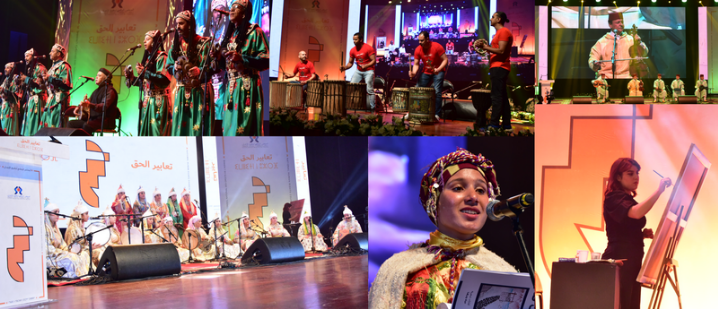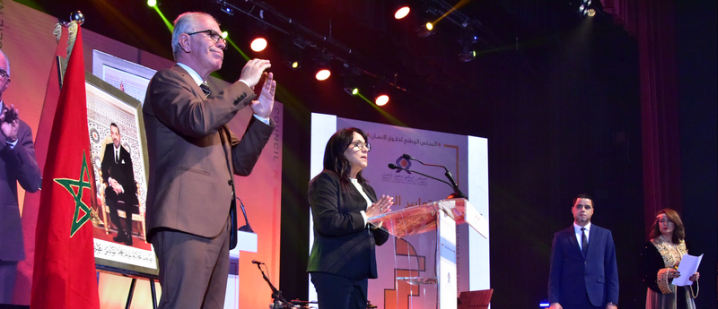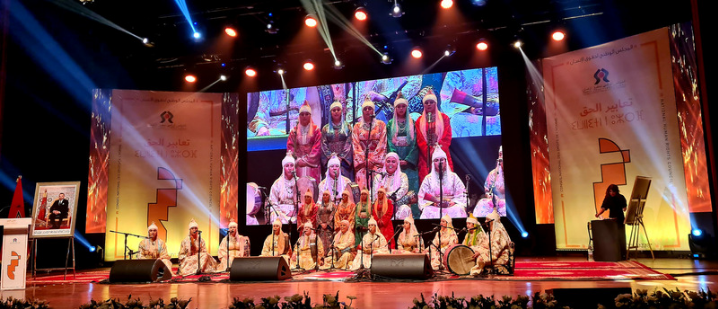CNDH celebrates Human Rights Expressions on the occasion of International Human Rights Day

The audience enjoyed the opening of the “Human Rights Expressions” ceremony and the celebration of the International Human Rights Day starting with the rhythm of percussions drawn from the Moroccan heritage and its African roots performed by young artists with disabilities active in the Association “Jamiat Taranim Lil'iqae Alfani Al'ifriqi” (Taranim for African Artistic Rhythm Association).
The Human Rights Expressions Ceremony was organized by the National Human Rights Council (CNDH) on Monday 19 December 2022, at the Mohammed V Theater in Rabat, Morocco. It coincides with the 75th anniversary of the Universal Declaration of Human Rights (UDHR).
Through this event, the CNDH aims to draw attention to the promising and dual possibilities that abound in all artistic, literary and intellectual expressions to protect and promote human rights, stated Mrs. Amina Bouayach, CNDH Chairperson in her opening speech on this occasion.
The ceremony reflected human rights manifestations through various artistic and cultural expressions.

A moment of recognition...
Honoring Mrs. Aicha Bassry, poet and novelist, during this ceremony, was a distinctive moment that carried many meanings. It reflected the CNDH’s appreciation of the Moroccan novelist and poet’s contributions to addressing human rights issues and the situation of Arab women.
Mrs. Bassry considered this tribute a unique moment of great value from a constitutional human rights institution.
Musical expressions...
The attendees, including governmental and diplomatic personalities, representatives of public institutions, and human rights defenders... enjoyed African melodies performed by young men with hearing and speech disabilities, but they charmed the audience with their ability to control the rhythm of percussions, relying on their sense of the stage echo... It was a show that proved the endless creativity of this group and their ability to raise the biggest challenges.
The Hymn performed exclusively by women of “Akhawat Alfan Al’Asil” (Sisters of Authentic Art for Hadra Chefchaounia) reflected the ability of Moroccan women to challenge cultural and social obstacles to exercise their right to expression by singing the original musical heritage distinguishing the Moroccan cultural identity. Those girls and women played and sang with melodious voices and received applause from the audience.
The performance of Gnaoua Music by Lamaallem Amlil Group, drawing the African roots of the Moroccan identity, was also particularly appreciated by the audience.
The Oulad Bouazzaoui band also entertained the audience with songs from Moroccan folk art L’Aïta. The band members took attendees on a musical journey to the heart of authentic Moroccan cultural and musical heritage.
The performance of Zakaria Ahlal, saxophonist, added a special touch to the various events of this artistic and human rights evening.
When poetry becomes a means of struggle...
“Because I am a girl… This does not mean that I cannot.” This was the title of the Hayat Outrahana poem. Hayat came from the Tounfite Commune in the Atlas Mountains to enlighten the audience to see the reality of a village girl. She used poems to express, defend and advocate her right to education and urge her peers, in both Amazigh and Arabic languages, to study and combat child marriage, etc.
"Fatat Girl"( Girl’s Crumbs) is the first poetry collection of the student Hayat Outrahana. It was published with CNDH support and included about 70 poems.
Baraka Baraka...wa Baraka! (Enough is enough!)
Children's voices were also heard in this Human Rights Expressions Ceremony. Recorded plays filled with human rights messages were performed by children of a public primary school in Rabat, Morocco, in partnership with the CNDH.
These messages advocate for children's rights to education and health and condemn violence against women and girls. These plays will also be performed in Moroccan schools and on the CNDH social media pages.
This celebration culminated in the creative work of art of the student, Aya Amrani Jamali, who, throughout the three hours of the ceremony, was drawing a painting that chronicles this distinguished human rights event.
Human Rights Expression Ceremony on the CNDH Facebook page























